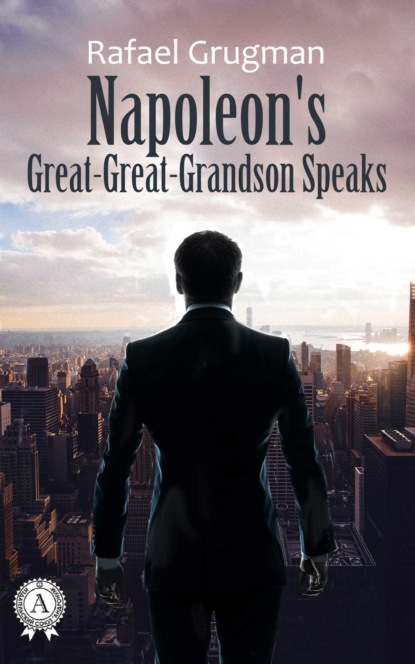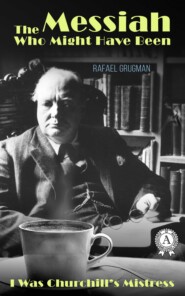По всем вопросам обращайтесь на: info@litportal.ru
(©) 2003-2025.
✖
Napoleon Great-Great-Grandson Speaks
Настройки чтения
Размер шрифта
Высота строк
Поля
«Y-your Excellency,» Grigory quickly began crossing himself, «I swear by Christ the Lord, by the Blessed Virgin Mary, this is all a mystery to me. Spare me- and he began to cry-I have a son-,»
«By the way, about that son,» continued the Colonel, «why did you make a Jew out of a Christian? And there was probably a circumcision, according to their laws…»
Grigory nodded in agreement.
«I love her, Your Excellency. And, after all, emperors have married commoners before. Nicholas the First's older brother, Grand Duke Constantine, the heir to the throne-,» he babbled, but the Colonel made a face and interrupted him:
«Stop. We will not touch the imperial name. We are talking about you. So, Mr. Ravelli, I am waiting for explanations. And soon. I've wasted too much time on you as it is.»
Grigory arrived home only the next morning. Rakhil, catching sight of him, simply threw up her hands.
«Gotenu, why do I have such tsures! Girsh,» she called him by his Jewish name, «what have they done to you?»
Grigory collapsed wearily onto a chair and, slowly enunciating the words, got out: «Things are bad for us. Bad,» and repeated the conversation.
Women are usually more resolute than men. And, without thinking about consequences, they make decisions rashly.
«Girsh, get all our documents in order, and let's go to America. They're never going to leave us in peace.»
After deliberating, the couple decided that Grigory should go to Kishinev and begin petitioning to get a passport for foreign travel. And, at the same time, try to find out whether it would be possible, in the near future, to secretly get on any ship leaving Odessa, and illegally travel abroad. And, once he was there, send for his family.
That very day, without waiting for another summons for questioning, Grigory headed for Kishinev; and a week later, sad news made it back to Tiraspol.
According to eyewitnesses, he was walking down the street. Not far away, students had come out onto the thoroughfare. They were shouting antigovernment slogans, smashing glass in wealthy stores, and breaking signposts.
Cossacks, gathered in the side streets to break up the student demonstration, came out unexpectedly. If Grigory had known about riots, he would have managed to dodge them and run into an entryway. But the janitors, expecting the dispersal of the rioters, had prudently locked the gates. When the Cossacks burst out in an avalanche onto the street, smashing every living thing beneath them, he was unable to hide and was trampled by their horses.
Zubatov found out about it sooner than Rakhil. Ravelli's corpse happened to be recognized by a doctor in the city hospital, who had once known, not only Grigory, but his father as well.
That was how it came about that Grigory was not buried as a nameless victim. As for the fact that no family members were present at the funeral-no one is to blame for that. Where Tiraspol is, and where Kishinev is…you have to understand.
For lack of a prime suspect, Zubatov closed the investigation and went away to Petersburg. Ravelli's widow, as he supposed, was ignorant of her husband's secret. And his sisters… Two had died in childhood. The third was a revolutionary. A fugitive. And had long ago severed family ties with her brother.
Zubatov was mistaken. Probably because he had never really loved anyone. And, therefore, had never trusted anyone. Rakhil knew Grisha's secret. If she could make up her mind to deceive her father and marry a Catholic, passing him off as a Jew, then she could keep a secret.
She understood that the police would leave neither her, nor her son, in peace; and, as soon as an opportunity arose, she went away with Shmuel to Gaisin.
At the police department, she represented herself as the victim of a fire, in which all her documents had burnt up; and, in return for a small bribe, she obtained new ones. (In this, she was helped by her cousin, the owner of a barbershop). In any case, she wrote down a different person as Shmuel's father. Her own cousin. Thus my grandfather became Shmuel (Samuil) Solomonovich.
The family's subsequent history was not as unclouded as might be wished, but the police did not trouble them.
The French Intelligence Service, having rooted around for an unspecified amount of time in the Odessa area, and spent no small sum of money, received information regarding Ravelli's death. And calmed down…until 1912…
That year, the centennial of the Battle of Borodino was celebrated. In one of the Petersburg newspapers information appeared-obtained, God knows where-about Napoleon's secret visit to Russia-that is, to Odessa. They wrote about the appearance in 1808 of an heir, who later lost himself in Russia's vast spaces.
The author (his pseudonym was very soon exposed) was fighting for the establishment of a constitutional monarchy in France; and Russia, as France's ally, ought to assist her in this endeavor…
By the time the article had reached Paris; by the time they had become alarmed in the Élysée Palace and given orders to the Secret Service to carefully, so as not to quarrel with an ally, verify its authenticity-a world war had begun… The problem was set aside until a better time.
On November 11, 1918, at twelve noon, the first of a hundred and one shots rang out through Paris, proclaiming that the First World War, which had lasted four years, three months, and twenty-six days, was over. This permitted the French government to renew the search for the imperial heirs who had vanished in Russia.
With this goal in mind, a military expedition was quickly thrown together, apparently directed towards the protection of French interests. In a secret commission, given to the head of the expeditionary corps, were orders to begin an active search for the Ravelli family along the whole Black Sea coast of Russia.
Less than two weeks later (the new premier, Clemençeau, really hurried his generals), on November 23, the first French vessels visited Novorossiisk. After another three days, on November 26, troops landed at Odessa and Sevastopol. The search for the Ravellis led to a large-scale military operation. After a hundred and six years, a French soldier once again stepped onto Russian soil.
Soon, in all the newspapers printed in cities under the control of the occupying forces, there appeared announcements inviting all Ravellis, in connection with the discovery in France of the enormous legacy of Count Ravelli, to appear at the Commandant's office with documents verifying the ancestry of the bearer of the papers.
The approach was an original one. Russian Ravellis themselves responded to the honey-coated cake, providing the opportunity for the professionals, without arousing suspicion, to root around in their biographies.
In order to speed up the search, bait was placed in the prepared cage: the one who helped to find the lucky owner of the enormous fortune would also be generously rewarded. Thanks to this clause, all those who had dreamed in childhood of treasure hunts were brought in on the search for the Ravellis, and now were provided with an excellent opportunity to realize their distant dreams.
Several Ravellis, nibbling at the bait, whose biographies excited particular suspicion among the counterintelligence agents, were even conveyed on board a ship. But each time, when the engineers were ready to start the ship's engines, it was discovered that this Ravelli was not the right one.
Grandfather Shmuel did not read newspapers, and no citizen, excited by the generous reward, guessed that Shmuel Rivilis was that «heir» to Count Ravelli, for whom the occupying powers were unsuccessfully searching.
I don't know why, over the course of two centuries, precisely on the10
of April, events have occurred that reflected in one way or another on the fate of our family. That day has been both joyous and sad: each time, like the flip of a card, producing a significant outcome.
So it was in 1919. Just before dinner, Shmuel picked up boot-hose, carefully wrapped in a newspaper, from the cobbler. When he got home and opened it, he read the announcement put out by the French. He was terribly upset, being four days too late.
On April 6, the French squadron had left the Port of Odessa, abandoning hope of finding Napoleon's descendant.
That year, God was merciful, preserving my grandfather from temptation. This he came to understand later. But at the time, he cried bitterly. The opportunity to pull himself out of beggary had been so close…
By that time, he had two daughters-Khaya and Golda…but his firstborn, his only son, had died after living less than one year…
Twice more, April 10 has proven memorable. On that day, in 1944, while living as evacuees, our family found out about the liberation of Odessa. Forty-five years later, on April 10, 1989, Golda, my mother, was buried in Odessa in the Third Jewish Cemetery. Grandfather had wound up there quite a bit earlier. But he managed to leave her two notebooks, written in a minute hand.
In a language unknown to me (Grandfather, although he learned to write Russian in his old age, fearing the evil eye, preferred Yiddish), he handed down to his grandchildren the history of the family. Two years before his death, Mama translated it into Russian; and now I, Yevgeny Rivilis, have taken the liberty of telling you all about it.
Yevgeny Rivilis, great-great-grandson of Bonaparte
Rafael Grugman: After this lengthy introduction, it is time for the reader to get familiar with the manuscript. I cannot vouch for whether everything in it is accurate. It is possible that its author, Yevgeny Rivilis, deliberately changed some of the names; after all, the earth-shattering historical events he describes are not that distant, and he could not disclose the true names of existing FBI and CIA agents, which are a state secret in the United States of America. Or perhaps he chose not to do this, because he was not thinking about publication. But since I am not able to address this question to the author of these memoirs, and since I do not wish to become the next Edward Snowden by accident, I have at least changed the names of U.S. intelligence officials mentioned in his manuscript. However, the events described are authentic, with the exception of a few minor details in which I had a hand, as I mentioned previously, in order to fill the gaps in the narrative. And since the main events did in fact take place in New York, I have left the title the same as the one chosen by Rivilis: Coney Island Laughs Last.
CONEY ISLAND LAUGHS LAST
For Mikhail Godkin
PART ONE
SOME STRANGE THINGS HAVE BEEN HAPPENING RECENTLY
While having dinner once, the Almighty dropped a plate, and it shattered into many pieces. Don’t rush to pick them up. Take a closer look. Call the biggest fragment Long Island and draw the outline: Brooklyn, Queens, Nassau and Suffolk. Call the smaller fragments Manhattan, Staten Island, Roosevelt…
Now give each fragment the exotic-sounding name of «island.» Put together a mosaic and place the biggest plate right next to it, upside down. Once you have it, make it a dessert and call it «the mainland.» Since there may be several dishes, your mainland is North America. Call a tiny part of the mainland adjoining the mosaic The Bronx. Connect everything with invisible Scotch tape. And then take off!
That’s how I imagined the picture of the creation of the world when I first saw the majestic panorama of New York City from the cockpit of the police helicopter.







